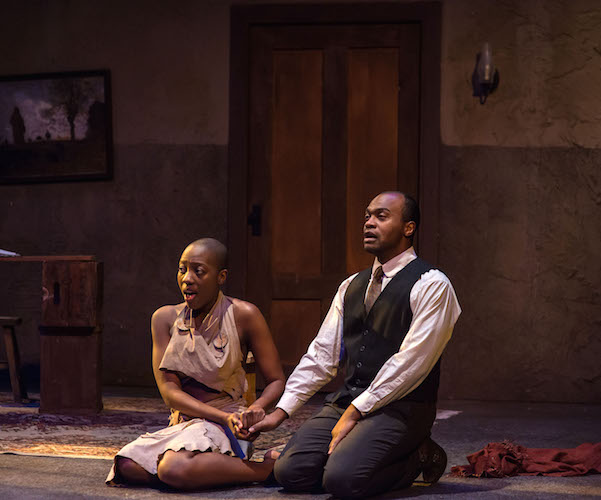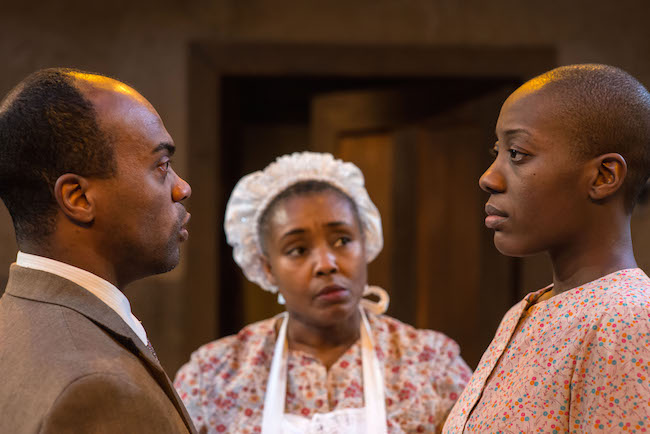Theater Review: “The Convert” — A Zimbabwean Tragedy
The Convert is a complex historical drama that shows us individuals crushed among powerful contradictions.
The Convert by Danai Gurira. Directed by Megan Sandberg-Zakian. Presented by Underground Railway Theater at Central Square Theater. Cambridge, MA, through February 28.

Adobuere Ebiama and Maurice Emmanuel Parent in the Underground Railway Theater staging of “The Convert” at the Central Square Theater. Photo: A.R. Sinclair Photography.
By Ian Thal
Danai Gurira is a Zimbabwean-American playwright and actress best known to American audiences for her role on TV’s The Walking Dead. As a dramatist, she has taken on the ambitious task of telling the history of Zimbabwe in a cycle of plays. This installment is set between 1895 and 1897 in a drawing room (wonderfully realized by scenic designer Jenna McFarland-Lord) in Salisbury, British South Africa, now Harare, Zimbabwe. The Convert dramatizes individuals crushed among powerful contradictions, victims of the inevitable clash between the traditional cultures of the Shona and Ndebele peoples and the modernizing ways introduced by the British Empire and its Christian missionaries.
The young Shona woman Jekesai (Adobuere Ebiama) is brought by her cousin Tamba (Ricardy Charles Fabre) to the home of Chilford (Maurice Emmanuel Parent), where Tamba’s mother (Liana Asim) is employed as a housekeeper. Jekesai is fleeing her uncle (Paul S. Benford Bruce), Mai Tamba’s younger brother, who wishes to marry her off to a much older man in return for a herd of goats. In the patriarchal culture of the Shona, polygamy is common, so not only is Jekesai running from a forced marriage, but from becoming just the latest of her betrothed’s several wives. Chilford, a western-educated African, a commissioner for native affairs for this district and a devout Roman Catholic, has an eye for the priesthood. When Jekesai states her desire to accept Jesus Christ as her Lord and Savior, he vows both to protect her and to provide employment and education. Renamed Ester, she is an earnest believer: Chilford’s will and determination is sufficient proof that Jesus is a powerful deity.
Of course, Gurira is borrowing some narrative elements from George Bernard Shaw’s Pygmalion. Ester’s Western education — learning to speak, read, and write in English, acquiring knowledge of scripture and liturgy, an acceptance of colonial culture — makes her into her own woman. (Though she is shocked to learn that the racism of white colonials neatly trumps their shared Christian faith.) But Gurira isn’t simply transporting Shaw’s tale to southern Africa; there is a hostile world outside of Chilford’s house. Chilford is a rabid iconoclast, combating pagan ritual in his efforts to advance the Catholic faith (Parent seems to be director Megan Sandberg-Zakian’s go-to guy for portraying religious zealotry). The economic inequalities of colonial rule undermine an agrarian and barter-based social order through the imposition of taxes, wage-labor, and mining. Western paternalism goes a step too far when diseased cattle are slaughtered without compensating poor cowherds: it is no surprise that violence erupts at the end of the second act.
Among the strengths of Gurira’s drama is that the British remain an off-stage presence, present only in the manners and names of the narrative’s English-educated Africans. My first review for The Arts Fuse was of J.T. Rogers’ The Overwhelming, which placed an insufferably stupid, mostly white, American family in the middle of the Rwandan Genocide, perhaps under the misguided notion that audiences cannot appreciate an African story unless the protagonist speaks with an English or American accent. Let’s hope we have gone beyond (or is that left behind?) this kind of hand-holding. Judging by the intense reception the mostly white audience at the Central Square Theater gave The Convert on the night I attended, there is no need to import an American perspective to make ‘international’ drama accessible.

Maurice Emmanuel Parent, Liana Asim, and Adobuere Ebiama in the URT staging of “The Convert” at the Central Square Theater. Photo: A.R. Sinclair Photography.
The only misstep here lies in Sandberg-Zakian’s program notes — my sole quibble with what is an exceptional collection of dramaturgical materials in both the playbill and on Central Square Theater’s website. Still, it is revealing. Sandberg-Zakian tries to connect The Convert with American identity politics conflicts, dedicating two paragraphs to the fact that Dylann Roof, the terrorist who attacked the Mother Emanuel Church in Charleston, South Carolina, wore the symbol of the white-supremacist regime of Rhodesia on his jacket (one of many shibboleths used by white-supremacists, since both the swastika and the stars-and-bars are easily recognized). This seems to put his murderous rage on par with the well-organized tyranny of the British Empire in Africa — one that could co-opt even a dedicated altrurist like Chilford. Why must we attempt to see other countries as allegories for ourselves? What is so wrong with presenting a story of another continent simply for the sake of broadening our perspectives? Must everything be about ourselves? Most Americans will miss the nuances when Shona is spoken or foreign concepts are introduced, but there is nothing wrong with that, so long as we possess the humility to understand that we are not catching things the first time around. (Gurira recently founded Almasi, a theater company in Zimbabwe that will most likely stage the play for Zimbabwean audiences.)
Parent gives an accomplished performance of Chilford, catching the figure’s contradictions, his severe asceticism and compassionate magnanimity. Even the performer’s fingers are used to express his spiritual breakdown when violence comes to Salisbury and then reaches into his drawing room. Ebiama’s Jekesai/Ester navigates her ever-shifting identities with energetic panache, excited to carve her place in different worlds. Equiano Mosieri, as the English-educated Chancellor, provides plenty of swagger and machismo as the son of a defeated tribal chieftain who colludes with the British for the sake of hedonism and personal advancement. Perhaps Gurira’s most fascinating creation, though, is Prudence, Chancellor’s fiancé, the proud daughter of Ndebele warriors. Her erudition surpasses that of the men around her, yet she is stymied by the patriarchy and racism of both colonized and colonizer. Nehassaiu DeGannes’ performance admirably dovetails the bearing of a Victorian gentlewoman and noble warrior. She also speaks a precise Queen’s English that would put most BBC hosts to shame.
Andrew Kenneth Moss’ fight choreography (incorporating knobkerries – a weapon not usually seen on Boston stages) is compelling, but the actors’ feints were too obvious on the night I attended. Dialect designer Christine Hamel, working closely with Gurira’s script, has done an excellent job of helping Ebiama dramatize Ester’s growing erudition over three acts.
Gurira’s The Convert, with expert assistance from Sandberg-Zakian and her cast and crew, provides a moving glimpse into a complex, sometimes confusing, and ultimately tragic era in a country that has experienced a long chain of historical disasters.
Ian Thal is a playwright, performer, and theater educator specializing in mime, commedia dell’arte, and puppetry, and has been known to act on Boston area stages from time to time, sometimes with Teatro delle Maschere. He has performed his one-man show, Arlecchino Am Ravenous, in numerous venues in Massachusetts and Rhode Island. One of his as-of-yet unproduced full-length plays was picketed by a Hamas supporter during a staged reading. He is looking for a home for his latest play, The Conversos of Venice, which is a thematic deconstruction of Shakespeare’s The Merchant of Venice. Formerly the community editor at The Jewish Advocate, he blogs irregularly at the unimaginatively entitled The Journals of Ian Thal, and writes the “Nothing But Trouble” column for The Clyde Fitch Report.
Tagged: Central Square Theater, Danai Gurira, Megan Sandberg-Zakian, The Convert
